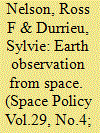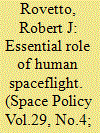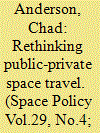|
|
|
Sort Order |
|
|
|
Items / Page
|
|
|
|
|
|
|
| Srl | Item |
| 1 |
ID:
127564


|
|
|
|
|
| Publication |
2013.
|
| Summary/Abstract |
Why the draft Treaty on the Prevention of the Placement of Weapons in Outer Space, the Threat or Use of Force Against Outer Space Objects (PPWT) will not work - whereas the Code of Conduct for Outer Space Activities may.
|
|
|
|
|
|
|
|
|
|
|
|
|
|
|
|
| 2 |
ID:
127515


|
|
|
|
|
| Publication |
2013.
|
| Summary/Abstract |
Remote sensing scientists work under assumptions that should not be taken for granted and should, therefore, be challenged. These assumptions include the following:
1. Space, especially Low Earth Orbit (LEO), will always be available to governmental and commercial space entities that launch Earth remote sensing missions.
2. Space launches are benign with respect to environmental impacts.
3. Minimization of Type 1 error, which provides increased confidence in the experimental outcome, is the best way to assess the significance of environmental change.
4. Large-area remote sensing investigations, i.e. national, continental, global studies, are best done from space.
5. National space missions should trump international, cooperative space missions to ensure national control and distribution of the data products.
At best, all of these points are arguable, and in some cases, they're wrong. Development of observational space systems that are compatible with sustainability principles should be a primary concern when Earth remote sensing space systems are envisioned, designed, and launched. The discussion is based on the hypothesis that reducing the environmental impacts of the data acquisition step, which is at the very beginning of the information stream leading to decision and action, will enhance coherence in the information stream and strengthen the capacity of measurement processes to meet their stated functional goal, i.e. sustainable management of Earth resources. We suggest that unconventional points of view should be adopted and when appropriate, remedial measures considered that could help to reduce the environmental footprint of space remote sensing and of Earth observation and monitoring systems in general. This article discusses these five assumptions in the context of sustainable management of Earth's resources. Taking each assumption in turn, we find the following:
(1) Space debris may limit access to Low Earth Orbit over the next decades.
(2) Relatively speaking, given that they're rare event, space launches may be benign, but study is merited on upper stratospheric and exospheric layers given the chemical activity associated with rocket combustion by-products.
(3) Minimization of Type II error should be considered in situations where minimization of Type I error greatly hampers or precludes our ability to correct the environmental condition being studied.
(4) In certain situations, airborne collects may be less expensive and more environmentally benign, and comparative studies should be done to determine which path is wisest.
(5) International cooperation and data sharing will reduce instrument and launch costs and mission redundancy. Given fiscal concerns of most of the major space agencies - e.g. NASA, ESA, CNES - it seems prudent to combine resources.
|
|
|
|
|
|
|
|
|
|
|
|
|
|
|
|
| 3 |
ID:
127501


|
|
|
|
|
| Publication |
2013.
|
| Summary/Abstract |
The question is: should the United States and nations at large pursue a human spaceflight program (and if so, why)? I offer an unwavering positive answer to this question, and state the reasons for it while considering the broad challenges and benefits of (human) spaceflight. Space exploration is a human activity that is intrinsically forward-looking, and as such, has positive potential. Both national and international space programs can galvanize the population, inspire the youth, foster job-creation, and motivate the existing workforce. The nature of the enterprises involved-their scale, novelty, and complexity-requires a steady and continuous upward progression toward greater societal, scientific and technological development. That is, in order to overcome the challenges of human spaceflight, progress is required. More to the point, the survival of humanity depends on expanding beyond the confines of our planet. Human spaceflight, in short, presents us with an opportunity to significantly advance the nation and the global community.
|
|
|
|
|
|
|
|
|
|
|
|
|
|
|
|
| 4 |
ID:
127512


|
|
|
|
|
| Publication |
2013.
|
| Summary/Abstract |
The envisaged future space research programmes, whether in the field of space exploration or Earth observation are becoming more and more technically complicated and so costly that a single nation can hardly afford to realize them. Major non-European space-faring nations, China and India will progressively play an important role besides US, Russia and Japan. The Space Advisory Group of the European Commission recommended that the European Commission supports within Horizon 2020 a comprehensive Robotic Mars-Exploration Programme under European leadership that should become an essential element of a coordinated international space research programme. The International Space Station (ISS) experience shows that cooperative space programmes build links between industries and laboratories from around the world, which then further develop in non-space related activities, with positive impact on the economy and scientific research. Strategies need to be developed to mitigate the gradual increasing risks incurred by climate change. In order to lower their entry barrier to engage in space emerging and developing space nations need to be included in cooperative space programmes. We present the recommendations of the Space Advisory Group of the European Commission concerning Europe's participation to global space endeavours.
|
|
|
|
|
|
|
|
|
|
|
|
|
|
|
|
| 5 |
ID:
127545


|
|
|
|
|
| Publication |
2013.
|
| Summary/Abstract |
As the human spaceflight industry grows the agencies charged with regulating that industry meet significant challenges. An improvement in launch success would improve the safety for the crew and passengers of a commercial human spaceflight. With respect to ELV launches, NASA's regulations over civil launches are mission success oriented while commercial launches regulated by the FAA-AST, the agency that will also be charged with human spaceflight, takes a more public safety oriented stance. A comparison of the launch success between civil and commercial launches is used to inform the decision on whether or not mission success would be an appropriate regulatory stance for the FAA-AST. The results show that there is no significant difference in launch success between civil and commercial ELV launches. Because of this and because the industry is wary of over regulation, there is indication that a mission success oriented stance might not be appropriate for regulating commercial human spaceflight.
|
|
|
|
|
|
|
|
|
|
|
|
|
|
|
|
| 6 |
ID:
127559


|
|
|
|
|
| Publication |
2013.
|
| Summary/Abstract |
Richard Rovetto has done a good job of assembling various arguments that are commonly advanced for a program of manned space flight. I will take them up one by one, and explain why I find them all unconvincing.
|
|
|
|
|
|
|
|
|
|
|
|
|
|
|
|
| 7 |
ID:
127552


|
|
|
|
|
| Publication |
2013.
|
| Summary/Abstract |
On May 24, 2012 SpaceX's Dragon capsule was launched and in doing so became the first commercially built vehicle to berth with and carry cargo to the International Space Station (ISS). It successfully completed its mission and returned to the Pacific Ocean on May 31, 2012.1 The docking of Dragon represented a historic moment where a commercial enterprise managed to achieve that which had previously only been accomplished by governments. "In the history of spaceflight - only four entities have launched a space capsule into orbit and successfully brought it back to Earth: the United States, Russia, China, and SpaceX".2 While this is a monumental accomplishment for private industry, we cannot ignore the value of public-private partnerships and the role that government played in enabling this incredible achievement.
In this paper I will examine how public-private partnerships are enabling the development of the commercial space industry, viewed through the lens of the Rethinking Business Institutional Hybrid Framework put forward by University of Oxford professors Marc Ventresca and Alex Nichols in their Rethinking Business MBA course. I intend to demonstrate that the NASA versus Commercial Space argument is a false dichotomy and that only by working together can both sectors continue to push the boundaries of space travel and exploration. I plan to do this by first discussing how the NASA-SpaceX partnership came about and the reasoning behind it. I will then explore what a public-private partnership (PPP) is, as compared to other government privatization schemes, and explain why Space Act Agreements are significantly different from anything done previously. I will then analyze the impact of these agreements and outline their benefits in order to demonstrate the value they create, especially in areas of mutual value creation and economic development.
|
|
|
|
|
|
|
|
|
|
|
|
|
|
|
|
| 8 |
ID:
127543


|
|
|
|
|
| Publication |
2013.
|
| Summary/Abstract |
The following paper reports the results of a research work carried from 2008 on the topic of strategies and determinants of space technology Transfer (TT). In particular, the aim of this study is to present: 1. The policies and strategies the major space agencies adopt for TT, 2. The operational mechanisms and determinants involved in the transfer of space technologies to other industrial sectors. To this extent we have conducted in the last five years: six case studies of large space agencies, four TT case studies concerning the construction of scientific satellites, two case studies focused on space to earth TT programs undertaken by the Japanese aerospace agency, and two TT case studies examining Italian space companies.
The comparative and comprehensive analyses of these studies indicate that the space agencies of the more industrialized countries aim primarily at consolidating and developing the industrial systems in their own countries, which include the use of technology transfer programs, and that the transfer of space technologies follows the route "Earth-Space-Earth". With regard to the determinants of the TT process, the most important of these correlate with the type of technology in transfer, whereas organizational, economic and financial determinants have less significance.
|
|
|
|
|
|
|
|
|
|
|
|
|
|
|
|
|
|
|
|
|